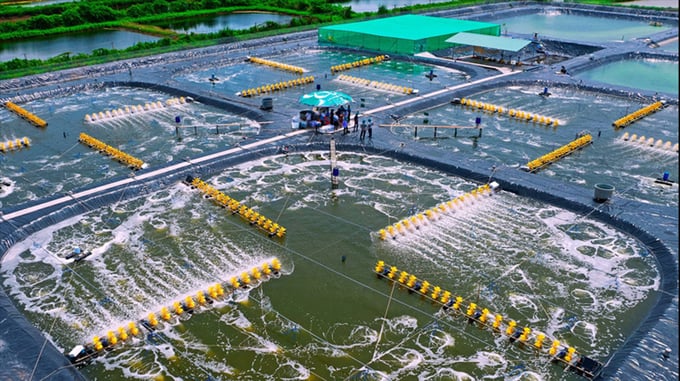November 19, 2025 | 19:42 GMT +7
November 19, 2025 | 19:42 GMT +7
Hotline: 0913.378.918
November 19, 2025 | 19:42 GMT +7
Hotline: 0913.378.918

VietShrimp 2025 will be held from March 26 to March 28, 2025, in Can Tho City. Photo: PN.
There is currently an urgent call to action with the aim of accelerating the “Greening” revolution across society. While Vietnam's shrimp industry has made encouraging progress toward greener production, it continue to face challenges on the path to sustainability.
On a positive note, public awareness regarding the importance of environmentally friendly shrimp production has grown markedly, both among producers and consumers. This shift has stimulated demand for certified green shrimp products.
The adoption of advanced technologies, such as recirculating shrimp aquaculture, in combination with the use of biological products and environmental monitoring systems, has helped mitigate negative impacts on ecosystems. Government support, through incentivizing policies, green credit funds and internationally recognized certifications for many shrimp farms, has facilitated the green transition.
However, the shrimp industry continues to face challenges in its progress toward sustainable development. Namely, high investment costs for technology and infrastructure, especially for smaller producers, generate significant financial pressure. Additionally, limited knowledge and technical skills for sustainable production remain barriers for farmers.
On the other hand, stakeholders also face challenges in reaching consumers and ensuring stable pricing for “green” shrimp products. Furthermore, environmental pollution from shrimp farming activities, particularly in concentrated farming areas, requires urgent solutions.
In summary, despite notable achievements, Vietnam's shrimp industry still requires significant and continuous efforts to promote its green transition. Accordingly, close collaboration among stakeholders—from the government and business community to shrimp farmers—is crucial to promoting this process. Consequently, this initiative will promote sustainable growth and enhance the competitiveness of Vietnam’s shrimp industry on the global market.
“Greening aquaculture” will be the central theme of the 6th Vietnam Shrimp Technology International Exhibition (VietShrimp 2025). The event will be hosted by the Vietnam Fisheries Society from March 26 to March 28, 2025, at the Can Tho Investment, Trade Promotion, and Exhibition Center, 108A Le Loi Street, Cai Khe Ward, Ninh Kieu District, Can Tho City.
VietShrimp 2025 will provide an interactive platform for shrimp producers, companies, and international representatives.
The event will include an exhibition area featuring over 200 product booths from various sectors, such as seed stock, machinery, aquaculture feed, veterinary products, and biological products. In addition, a series of four workshops with participation from managers, businesses, and experts from both Vietnam and foreign partners will provide a platform for insight sharing and solution discussion, with the ultimate goal of “greening aquaculture.” This initiative aims to support the sustainable growth of the shrimp industry, expand Vietnam’s shrimp market reach, and further establish its position and brand in the global shrimp industry.
Translated by Nguyen Hai Long
/2025/11/19/4847-1-093540_448.jpg)
(VAN) The Gia Lai Provincial People’s Committee had a working session with the delegation of the U.S. Department of Agriculture, the State of Idaho, and representatives of the State's leading enterprises.

(VAN) Ca Mau has a sufficient foundation to become a strong regional aquaculture center, where production integrates the economy, the environment, and the lives of the people.

(VAN) SEIKI Group envisions itself as a pioneer in the ‘dual transformation’ of digital technology and green industry, standing alongside the Government and Vietnamese businesses in their pursuit of sustainable development.

(VAN) The VNGEONET network affirms Viet Nam's progress in mastering digital space, providing a precise positioning data platform to serve socioeconomic development.
/2025/11/14/3247-1-184556_35.jpg)
(VAN) Thai Nguyen is methodically implementing digital transformation in the livestock sector, laying the foundation for a modern, transparent, and sustainable agriculture.

(VAN) The year 2025 marks 80 years of development of the Agriculture and Environment sector, a proud journey with significant progress in production, integration and sustainable growth.

(VAN) De Heus continues to steadfastly pursue sustainable development, building linked value chains with farmers and businesses in Viet Nam.